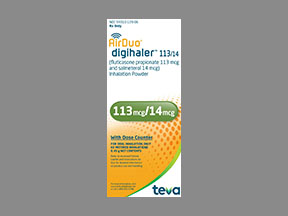
Airduo Digihaler Coupons & Savings Card – Discount Prices from $436.75
My prescription
Edit
113-14MCG/ACT, Airduo Digihaler (1 Aerosol Powder Breath Activated)
Select pharmacy

CVS
$463.18
COUPON PRICE
Walmart
$436.75
COUPON PRICE
Walgreens
$447.74
COUPON PRICE
Albertsons
$460.61
COUPON PRICEAirduo Digihaler savings card
Show this card to your pharmacist
Walmart
$436.75
BIN
ID
PCN
GRP
019876
LH1AFEFA59
CHIPPO
LHX
Powered by
Price history for Airduo Digihaler
1 Aerosol Powder Breath Activated, 113-14MCG/ACT
Average retail price for Airduo Digihaler
Average SaveHealth price for Airduo Digihaler
Our price history data is based on aggregated prescription data collected from participating pharmacies in America. Our prescription data updates daily to reflect the latest price changes. If you notice a missing data point, it means there wasn't sufficient data available to generate a monetary value for that date.
*Retail prices are based on pharmacy claims data, and may not be accurate when we don't have enough claims.
Airduo Digihaler dosage forms
Dosage Quantity Price from Per unit 55-14MCG/ACT 1 Aerosol Powder Breath Activated $436.75 $436.75 113-14MCG/ACT 1 Aerosol Powder Breath Activated $436.75 $436.75 232-14MCG/ACT 1 Aerosol Powder Breath Activated $493.87 $493.87
| Dosage | Quantity | Price from | Per unit |
|---|---|---|---|
| 55-14MCG/ACT | 1 Aerosol Powder Breath Activated | $436.75 | $436.75 |
| 113-14MCG/ACT | 1 Aerosol Powder Breath Activated | $436.75 | $436.75 |
| 232-14MCG/ACT | 1 Aerosol Powder Breath Activated | $493.87 | $493.87 |
Is AirDuo Digihaler being discontinued?
As of the latest available information, there has been no official announcement regarding the discontinuation of AirDuo Digihaler. It is advisable to check with a healthcare provider or the manufacturer for the most current updates.
What is AirDuo Digihaler used for?
AirDuo Digihaler is used for the treatment of asthma in patients aged 12 years and older. It helps to control and prevent asthma symptoms by reducing inflammation and opening the airways in the lungs.
Is AirDuo the same as Advair?
AirDuo and Advair are not the same, but they are similar. Both medications contain the same active ingredients, fluticasone propionate and salmeterol, which are used to treat asthma. However, they differ in their delivery devices and specific formulations. AirDuo is available as a RespiClick inhaler, while Advair is available as a Diskus or HFA inhaler. It is important for patients to follow their healthcare provider's instructions regarding which medication to use.
How much does AirDuo Digihaler cost?
The cost of AirDuo Digihaler can vary depending on factors such as the pharmacy, location, and whether the patient has insurance coverage. Without insurance, the price can range from approximately $300 to $400 for a 30-day supply. Patients are advised to check with their local pharmacy for the most accurate pricing and to inquire about any available discounts or patient assistance programs.
What is digihaler used for?
Digihaler is used as an inhaler to help manage and treat respiratory conditions such as asthma. It contains medication that helps to open the airways, making it easier to breathe. Additionally, Digihaler devices often have digital features that can track inhaler usage and provide data to help manage the condition more effectively.
